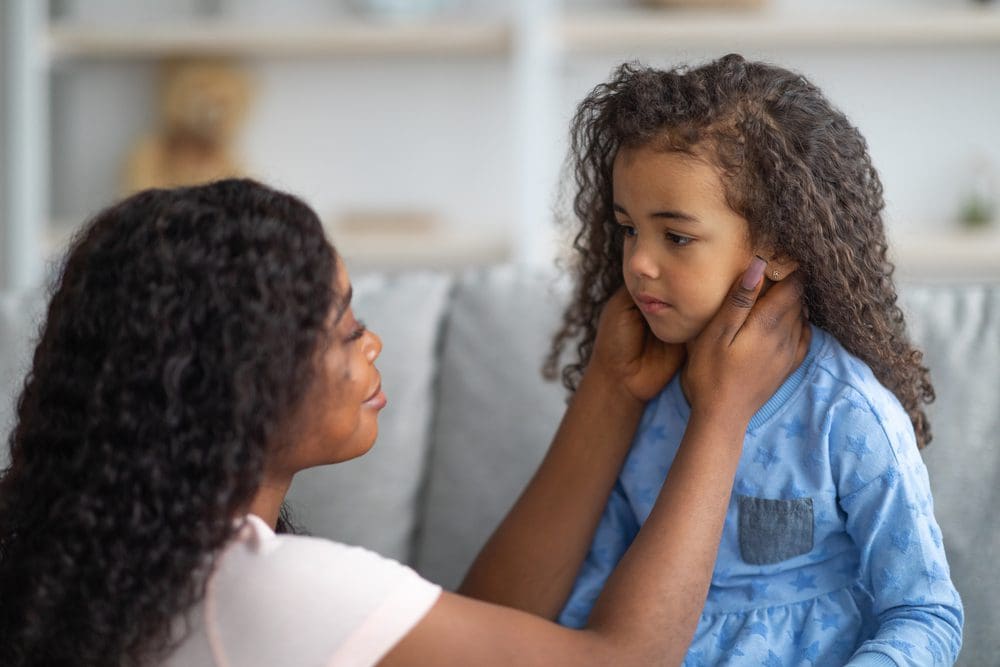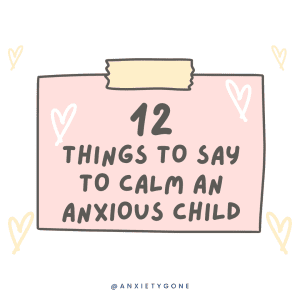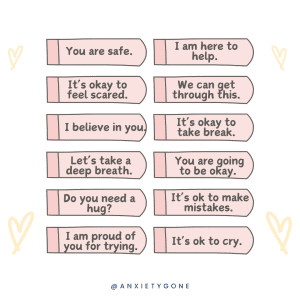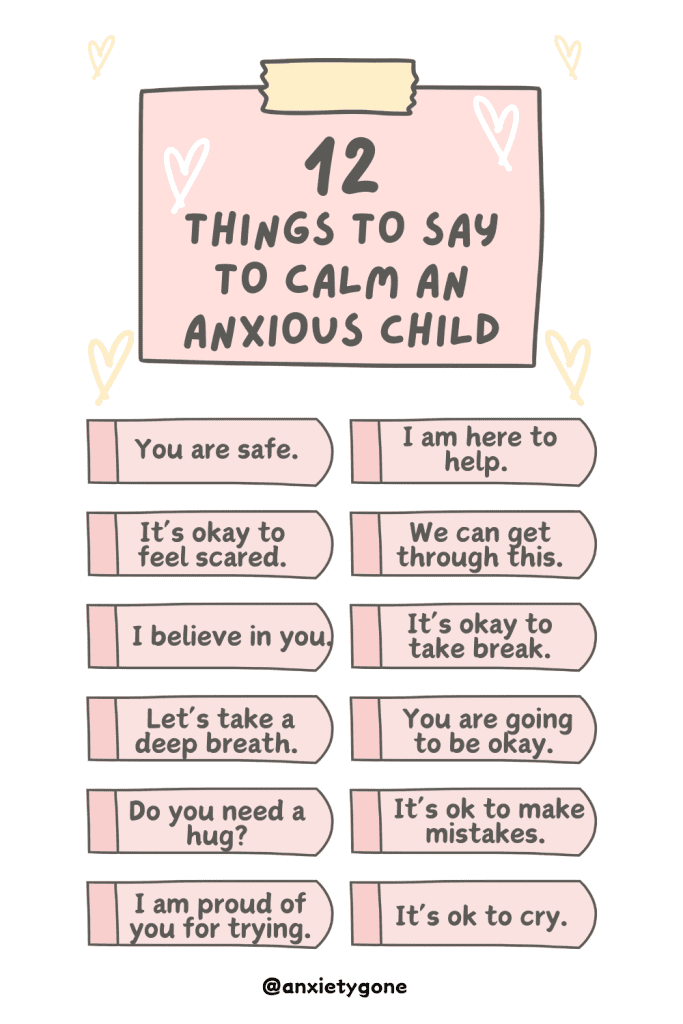Full Disclosure: Clicking on these links could mean a tiny commission for me, at no extra cost to you.
Generalized Anxiety Disorder (GAD) affects many children, often causing significant distress and impairing their daily functioning. Children with generalized anxiety may experience persistent worry, fear, and nervousness about various aspects of their lives. Understanding how to support these children is crucial for parents, educators, and caregivers. This article explores practical strategies for managing and alleviating anxiety in children, helping them lead happier, more productive lives.
Tips for Supporting a Child with Generalized Anxiety
Supporting a child with generalized anxiety can be challenging but incredibly rewarding. Children with generalized anxiety need a nurturing and understanding environment to help them manage their worries and fears. By incorporating specific strategies and techniques, parents, educators, and caregivers can play a pivotal role in reducing anxiety and fostering a sense of security and confidence. Below are practical tips for effectively supporting a child with generalized anxiety, ensuring they feel understood, supported, and equipped to handle their anxious thoughts and feelings.
Calm Your Child's Mind with Headspace
Discover guided meditations designed specifically for kids to help them relax, focus, and manage their emotions. Sign up today to receive a 14-day free trial with Headspace.
Free Trial
Calm Your Child's Mind with Headspace
Discover guided meditations designed specifically for kids to help them relax, focus, and manage their emotions. Sign up today to receive a 14-day free trial with Headspace.
Free Trial
1. Validate Their Anxiety Without Encouraging It
There are certain ways to deal with your child’s anxiety and just as many things to not do to avoid making it worse. For example, the number one thing any parent of a child with generalized anxiety needs to avoid is reinforcing and empowering your child’s fears. This will only result in worsened anxiety towards specific scenarios. Unfortunately, it’s something that many of us parents do because we think we’re helping but allowing them to avoid situations and triggers. In reality, these types of things only instill the fear even further, making it more difficult for them to face them moving forward.
To put this in the simplest terms possible, if your child is extremely anxious and fearful of doctors, it’s important to avoid acting in a way that shows them doctors are something they need to be afraid of. How do you do this? Instead of removing the anxiety trigger entirely, such as allowing them to skip out on their doctors, you can help your child process and manage their fear by reassuring them that it will pass. In this way, you are teaching your child how to sit with anxious emotions instead of avoid them. Soon, they will learn that the unpleasant sensations they’re experiencing with anxiety isn’t permanent, they will pass and doctors appointments don’t have to be so scary.
Now, there are various ways you can help your child with anxiety by validating their feelings. Here are some ideas to get you started:
- Give your full attention to the child when they express their worries.
- Maintain eye contact and use nods or verbal affirmations to show you are listening.
- Use phrases like, “I can see that you’re feeling really worried about this.”
- Avoid dismissing their feelings with statements like, “There’s nothing to be afraid of.”
- Share similar experiences if appropriate, to show you understand.
- Reassure them that their feelings are normal, but emphasize that they are safe and supported.
- Help them brainstorm ways to handle their anxiety, focusing on practical solutions.
- Encourage them to think of times when they successfully managed their anxiety before.
- Offer a hug or hold their hand if they are comfortable with it.
- Sometimes physical presence can be very reassuring without needing many words.
2. Create a Supportive Environment
Creating a supportive environment is essential for helping children with generalized anxiety manage their feelings and reduce stress. This can be done with simple steps, such as encouraging open communication and establishing routine.
Here are some things to consider:
- Encourage children to express their feelings and concerns openly.
- Practice active listening by giving full attention and responding empathetically.
- Validate their emotions by acknowledging their feelings and showing understanding.
- Create a safe space where children feel comfortable sharing without judgment.
- Encourage positive interactions with peers to reduce isolation and anxiety.
- Maintain a consistent daily schedule for meals, homework, and bedtime.
- Use visual schedules or calendars to help children anticipate daily activities.
- Create predictable routines for morning and evening to reduce uncertainty.
- Be flexible and make adjustments as needed, but keep core routines stable.
- Facilitate opportunities for children to interact with peers through playdates or group activities.
- Encourage participation in extracurricular activities that interest them.
- Teach social skills and role-play scenarios to help children navigate social interactions.
- Encourage a supportive network by staying in touch with teachers, coaches, and other caregivers.
- Model positive coping strategies and stress management techniques.
- Provide a calm and organized home environment to minimize stress.
- Encourage hobbies and activities that promote relaxation and enjoyment.
- Recognize and celebrate small successes to build confidence and resilience.
3. Implement Cognitive Behavioural Techniques
Cognitive-behavioral techniques offer numerous benefits for supporting children with anxiety. They provide practical tools that children can use to navigate their fears and develop healthier coping strategies, leading to improved mental well-being and a greater sense of control over their anxiety.
Here are some ways to incorporate cognitive behaviour techniques in your household:
- Encourage children to write down their worries and fears.
- Teach them to identify and label irrational or unhelpful thoughts.
- Use a thought record to help children challenge and reframe negative thoughts.
- Practice “thought-stopping” techniques to interrupt anxious thinking.
- Introduce deep breathing exercises, such as the 4-7-8 technique.
- Guide children through progressive muscle relaxation, tensing and relaxing muscle groups.
- Encourage regular mindfulness practices, such as guided imagery or body scans.
- Create a calm-down corner with sensory tools like stress balls or calming visuals.
- Break larger tasks into smaller, manageable steps.
- Use a reward system to celebrate small achievements and milestones.
- Set specific, measurable, attainable, relevant, and time-bound (SMART) goals.
- Encourage children to track their progress and reflect on their accomplishments.
- Role-play scenarios to practice coping strategies in a safe environment.
- Use positive affirmations to build self-esteem and resilience.
- Create a worry jar where children can write down their worries and “release” them.
- Maintain a supportive and patient attitude, reinforcing that setbacks are a normal part of the learning process.
Help Your Anxious Child Today
Help your child manage stress and anxiety with The Tapping Solution. Discover simple, effective tapping techniques that can bring instant relief and build emotional resilience. Start your child's journey with a 14 days free!
Start Your Free Trial Today!
4. Encourage Healthy Lifestyle Habits
Healthy lifestyle habits play a crucial role in managing anxiety in children. For example, regular physical activity releases endorphins, which naturally reduce stress and improve mood. A balanced diet rich in essential nutrients supports brain health and emotional stability, helping children feel more balanced and less anxious. Adequate sleep is essential for emotional regulation, as are consistent routines and relaxation practices.
Here are some ideas to encourage healthy lifestyle habits, allowing your child with anxiety to develop a stronger foundation for managing anxiety:
- Incorporate fun and engaging physical activities like dance, sports, or family walks.
- Encourage participation in group activities or sports teams to build social connections and reduce isolation.
- Set achievable fitness goals and celebrate milestones to boost confidence.
- Involve children in meal planning and preparation to make healthy eating more appealing.
- Offer a variety of nutritious snacks and meals, making healthy choices readily available.
- Educate children about the benefits of different foods and how they impact their mood and energy levels.
- Establish a consistent bedtime routine to help children wind down and prepare for sleep.
- Create a calming bedtime environment, free from screens and distractions.
- Encourage relaxing activities before bed, such as reading or listening to soothing music.
- Maintain a predictable daily schedule to provide a sense of security and stability.
- Use visual schedules or calendars to help children anticipate daily activities and reduce uncertainty.
- Be flexible with routines but keep core aspects, like meal and sleep times, consistent.
- Introduce mindfulness practices, such as deep breathing, yoga, or guided imagery.
- Create a calm-down corner with sensory tools like stress balls or calming visuals.
- Practice relaxation techniques together as a family to model and reinforce these habits.
5. Support Your Child in Seeking Professional Treatment and Therapy
Are you finding it challenging to help your child manage their anxiety symptoms on your own? It might be time to call on a licensed professional who has attained the requisite accreditations. You’ll want to look for a professional or even a student taking an online counseling psychology class. These areas of study provide therapists (and aspiring professionals) with the necessary skills to support children who are diagnosed with GAD.
Placing your anxious child in therapy can produce great results. Studies have shown that anxiety therapies like cognitive behavioral therapy (CBT) and exposure therapy in particular can alter a child’s brain activity to help improve their anxiety symptoms. 1
To start the conversation about professional treatment and therapy with your child with anxiety, choose a quiet, comfortable place for the conversation where your child feels safe. Then, approach the topic with a calm and reassuring demeanor. Here are some additional tips:
- Explain what therapy is in simple, understandable terms that match your child’s age and comprehension level.
- Avoid technical terms that might be confusing or overwhelming.
- Talk about how therapy can help them feel better, manage their anxiety, and improve their daily life.
- Use relatable examples to illustrate how therapy can make a positive difference.
- Explain that many people, including kids and adults, go to therapy to help with their feelings.
- Compare therapy to going to a doctor for physical health, emphasizing that mental health is just as important.
6. Explore the Need for Anxiety Medications
Anxiety medications, like Selective Serotonin Reuptake Inhibitors (SSRIs), can greatly assist children with generalized anxiety. Many symptoms of generalized anxiety disorder have been linked to abnormalities in our serotonin production levels. So, someone with lower levels of serotonin is likely to experience higher levels of anxiety. SSRI medication can help overturn this by building up and normalizing serotonin levels.
It’s important to mention that SSRIs do not have an immediate effect. They are not those fast-acting drugs that come with a high risk of addiction. Instead, it can take up to 2 – 6 weeks for a patient to notice an improvement. Doctors also recommend slowly increasing doses over a period of time until the optimal dosage for the patient is reached.
Here are some ideas for talking about anxiety medications with your child:
- Create a calm and comfortable setting to discuss the topic.
- Let your child know it’s okay to ask questions and express their feelings about medication.
- Explain what anxiety is and how medications can help in simple, understandable terms.
- Avoid complex medical jargon that might confuse or overwhelm them.
- Discuss how the medication can help reduce their anxiety and improve their daily life.
- Highlight specific benefits they might notice, such as feeling calmer or sleeping better.
- Ask if they have any worries or fears about taking medication.
- Provide honest, reassuring answers to their questions, and dispel any myths they might have heard.
Exclusive Offer: Get a 14-Day Free Trial with the The Tapping Solution
Exclusive Offer: Get a 14-Day Free Trial with the The Tapping Solution
Conclusion
Supporting children with generalized anxiety requires a varied approach. With the tips provided in this article, you can create a supportive environment filled with cognitive-behavioral techniques and healthy lifestyle habits that will go a long way. Whether you’re a parent or caregiver to a child with anxiety, the steps you take can significantly help them manage their anxiety and improve their overall mental health.
FAQs
- What are common signs of generalized anxiety in children?
Common signs include persistent worry, restlessness, difficulty concentrating, physical complaints like headaches or stomach aches, and avoidance of social situations. - How can parents help children with generalized anxiety?
Parents can help by promoting open communication, establishing a routine, modeling healthy coping mechanisms, and seeking professional help when necessary. - Are there specific techniques to reduce anxiety in children?
Yes, techniques such as deep breathing exercises, mindfulness practices, and cognitive-behavioral strategies can help reduce anxiety. - How can schools support children with generalized anxiety?
Schools can support by providing academic accommodations, creating a supportive classroom environment, and encouraging involvement in extracurricular activities. - When should professional help be sought for a child with anxiety?
Professional help should be sought when anxiety significantly interferes with the child’s daily life, social interactions, or academic performance. - Can lifestyle changes impact a child’s anxiety levels?
Yes, lifestyle changes such as balanced nutrition, regular physical activity, and adequate sleep can positively impact a child’s anxiety levels.













